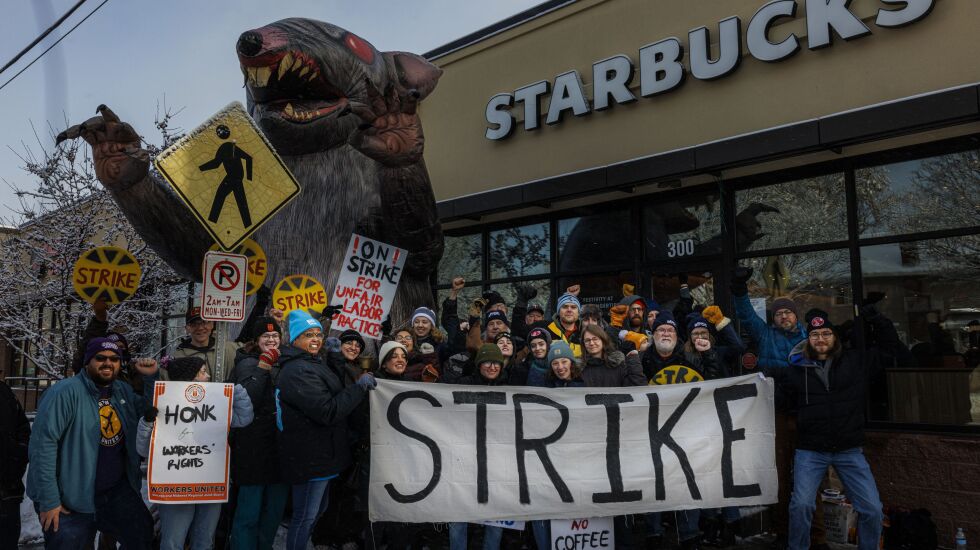One of the recurring stories on the business beat this year has been union organizing drives at coffee shops in Chicago and around the country.
Starbucks has gotten most of the attention. It’s the biggest corporate target, after all. But locally, there also has been labor activism at the Colectivo and Intelligentsia chains where employees have affiliated with the International Brotherhood of Electrical Workers. The IBEW this month scored a relatively quick contract agreement covering Intelligentsia’s five locations in Chicago, delivering a deal with higher wages, paid meal breaks, more holiday pay and other benefits.
At Colectivo, which the union organized more than a year ago, the bargaining has been a slog by comparison. The IBEW represents workers at five stores in the Chicago area and 15 in Wisconsin, potentially a large group of people. The union got its bargaining rights on a close vote of employees — the outcome hinged on a National Labor Relations Board decision to count some disputed ballots. So the company, which opposed the union drive, might sense weakness in the ranks.
Meanwhile, the activism by Starbucks baristas has warmed the hearts of many who have union sympathies. Here you have young people, a cohort often slandered as malingerers with no interests outside of their cellphones, standing up for themselves. They’ve picketed at a few stores, forcing people in quest of a latte to decide, in the words of an old labor anthem, “Which side are you on?”
But there are a lot of puzzlements in organized labor. One is that while Americans increasingly have a positive view of unions, few take the initiative to get one. A Gallup survey this year found 71% of Americans, a steady increase in recent years, favor organized labor. But the Labor Department says only 10.3% belong to unions, a rate little changed in recent years. Within the private sector, the rate is just 6.1%.
Another is how best to go about organizing, even where there’s fertile ground. It’s a tactical game that can drain anybody’s spirit.
Starbucks workers have rallied around Workers United, part of the Service Employees International Union. Workers United sometimes downplays the tie-in to emphasize the grassroots elements of the campaign. But the union’s $1 million pledge for a Starbucks strike fund didn’t come from baristas’ tip jars.
Workers United is organizing Starbucks so each store would be its own bargaining unit. Superficially, the strategy has paid off. At last count by the NLRB, the union has won elections at 269 Starbucks shops across the nation against 63 defeats. In the Chicago area, the won-lost record is 7-4, not counting a store that sided with the union and was subsequently closed.
With those victories in what’s now a more than year-old campaign comes the task of bargaining contracts. Initially, Workers United wanted to steer the company toward a national agreement for all unionized stores with carve-outs for local issues. Starbucks turned the union’s tactic against it, saying that if it wants store-by-store representation, that’s how the bargaining will be. And everywhere, they’ll argue down to the last comma. The company has taken a hard line against the union. The NLRB has filed at least five injunctions against Starbucks over allegedly unfair labor practices.

The IBEW, in contrast, clumped stores together to bargain over multiple locations. Union experts say the IBEW strategy has clear advantages. “You need a density of workers to be effective and to make management take you seriously,” said one expert reached last week. A retired union leader said Workers United might have been caught off guard by the quick spread of its campaign. “They got themselves in a trick bag. They will be under a lot of pressure to produce these contracts,” he said. Neither person wanted to be identified because of their criticism of SEIU.
Robert Bruno, professor of labor and employment at the University of Illinois, said Workers United is calculating that it can get a strong contract someplace that it can use to recruit members at more stores. “Research has shown that there can be a contagion, a spillover effect” when a union gets a victory, he said. “You can use the collective bargaining process to organize more workers.” If the union gains momentum, Bruno said, Starbucks could change gears and decide a national contract is in its best interest.
For now, the company probably thinks it can wait out a young workforce it believes will find another career. But Bruno said more workers are sticking around in the service economy. “Most of the benefits of the union activism might go to those who are on the payroll two or three years from now,” he said.
It’s not an uplifting message for the rank and file, but it’s practical. Those fired-up Starbucks employees need to hang tough to avoid a venti-sized serving of discouragement.







